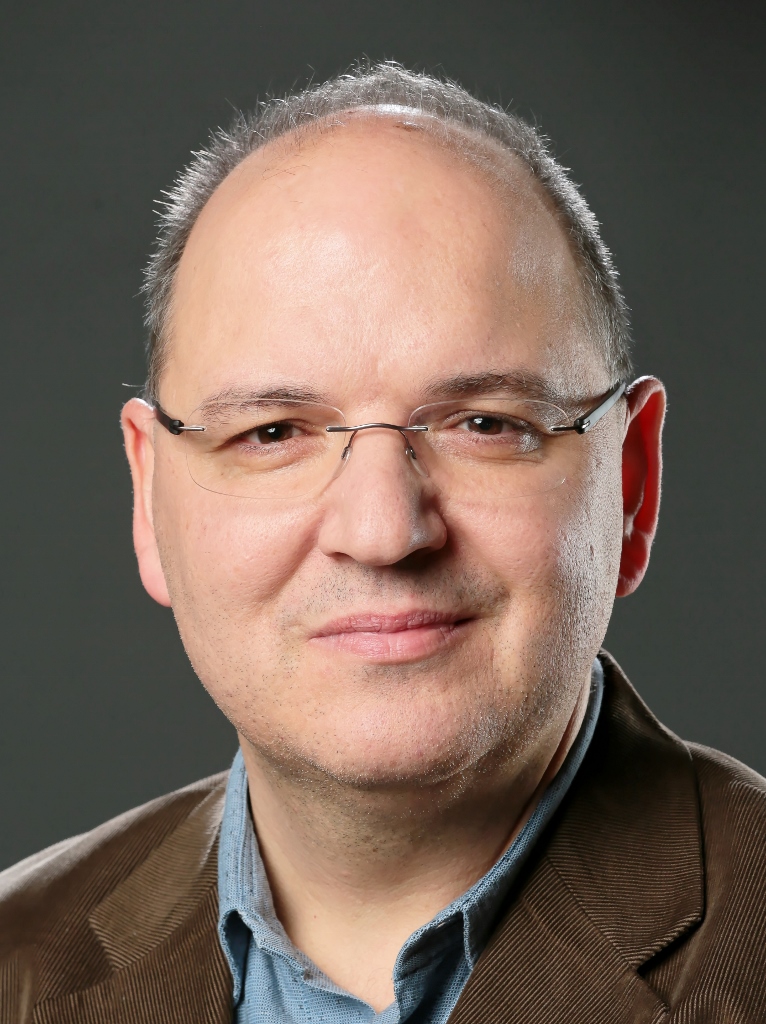Giovanni De Cesare

Operational Director
EPFL ENAC IIC PL-LCH
GC A3 514 (Bâtiment GC)
Station 18
1015 Lausanne
Web site: Web site: https://lch.epfl.ch/
Fields of expertise
Numerical simulation and physical modeling of hydraulic works; reservoir sedimentation, turbidity currents; reservoir sediment management; Ultrasonic Doppler flow measurement; river training work; fluvial eco-morphology; rapid transients in pressurized systems; commissioned studies and expert reports in applied hydraulics and hydraulic constructions; organization of continuous education workshops; Quality management
Publications
Infoscience publications
Infoscience
Effect of inclined jet screen on turbidity current
Journal of Hydraulic Research, IAHR. 2010. DOI : 10.1080/00221680903566042.Velocity profiles and interface instability in a two-phase fluid: investigations using ultrasonic velocity profiler
EXPERIMENTS IN FLUIDS. 2009. DOI : 10.1007/s00348-008-0594-1.Improvement of Acoustic Doppler Velocimetry in steady and unsteady turbulent open-channel flows by means of seeding with hydrogen bubbles
Flow Measurement and Instrumentation. 2008. DOI : 10.1016/j.flowmeasinst.2007.08.009.Flow field investigation in a rectangular shallow reservoir using UVP, LSPIV and numerical modelling
Flow Measurement and Instrumentation. 2008. DOI : 10.1016/j.flowmeasinst.2007.09.005.La gestion sédimentaire en milieu alpin
La Houille Blanche. 2008. DOI : 10.1051/lhb:2008049.Circulation in stratified lakes due to flood-induced turbidity currents
ASCE Journal of Environmental Engineering. 2006. DOI : 10.1061/(ASCE)0733-9372(2006)132:11(1508).Granting access to a high-level postgraduate study program in hydraulic engineering
2003. 2003 6th WFEO/ASEE World Congress on Engineering Education, Nashville, Tennessee, USA, June 20-22, 2003.Third International Symposium on Ultrasonic Doppler Methods for Fluid Mechanics and Fluid Engineering (3rd ISUD)
2002. Third International Symposium on Ultrasonic Doppler Methods for Fluid Mechanics and Fluid Engineering (3rd ISUD).Impact of turbidity currents on reservoir sedimentation
Journal of Hydraulic Engineering. 2001. DOI : 10.1061/(ASCE)0733-9429(2001)127:1(6).Alluvionnement des retenues par courants de turbidité
Lausanne, EPFL, 1998. DOI : 10.5075/epfl-thesis-1820.Effect of inclined jet screen on turbidity current
Journal of Hydraulic Research, IAHR. 2010. DOI : 10.1080/00221680903566042.Velocity profiles and interface instability in a two-phase fluid: investigations using ultrasonic velocity profiler
EXPERIMENTS IN FLUIDS. 2009. DOI : 10.1007/s00348-008-0594-1.Improvement of Acoustic Doppler Velocimetry in steady and unsteady turbulent open-channel flows by means of seeding with hydrogen bubbles
Flow Measurement and Instrumentation. 2008. DOI : 10.1016/j.flowmeasinst.2007.08.009.Flow field investigation in a rectangular shallow reservoir using UVP, LSPIV and numerical modelling
Flow Measurement and Instrumentation. 2008. DOI : 10.1016/j.flowmeasinst.2007.09.005.La gestion sédimentaire en milieu alpin
La Houille Blanche. 2008. DOI : 10.1051/lhb:2008049.Circulation in stratified lakes due to flood-induced turbidity currents
ASCE Journal of Environmental Engineering. 2006. DOI : 10.1061/(ASCE)0733-9372(2006)132:11(1508).Granting access to a high-level postgraduate study program in hydraulic engineering
2003. 2003 6th WFEO/ASEE World Congress on Engineering Education, Nashville, Tennessee, USA, June 20-22, 2003.Third International Symposium on Ultrasonic Doppler Methods for Fluid Mechanics and Fluid Engineering (3rd ISUD)
2002. Third International Symposium on Ultrasonic Doppler Methods for Fluid Mechanics and Fluid Engineering (3rd ISUD).Impact of turbidity currents on reservoir sedimentation
Journal of Hydraulic Engineering. 2001. DOI : 10.1061/(ASCE)0733-9429(2001)127:1(6).Alluvionnement des retenues par courants de turbidité
Lausanne, EPFL, 1998. DOI : 10.5075/epfl-thesis-1820.Teaching & PhD
Teaching
Civil Engineering
PhD Students
Eliyahu-Yakir Yahel, Irving Meghan Ellen, Kang Junjia, Padoan Francesca, Van Mol Romain Nathan Hippolyte Merlin, Vorlet Samuel Luke,Past EPFL PhD Students
Adam Nicolas Jean François Pascal Ghislain , Chamoun Sabine , Dubuis Romain Maxime , Foehn Alain Tommy , Jenzer Althaus Jolanda Maria Isabella , Mörtl Christian , Müller Michael ,Courses
Hydraulic structures and schemes
Hydraulic structures and schemes are vital for ensuring supply of clean and renewable energy as well as water in enough quantity and sufficient good quality in order to fight against famine, poverty and deceases in the world.
Fluvial hydraulics and river training works
The course provides the students with a solid theoretical background in fluvial hydraulics, as well as the basic concepts in river engineering that aim at conciliating hazard protection and environmental protection. Real-world examples illustrate the course.
Hydropower schemes and pumped-storage
The course deals with the conception and design of hydraulic structures used for production and/or storage of electric energy, including those of pumped storage. We present and discuss their technical, socio-economical and environmental feasability in the Swiss/European/Global energy transition.
River eco-morphology
The course deals with the interactions between hydraulics, solid transport by hauling and the watercourse space at the origin of the morphology and richness of habitats. Regime theory is presented and the quality of a stream's habitat is assessed.
Hidden rivers
Hidden Rivers aims at fulfilling the need for an interdisciplinary understanding of the problematics surrounding urban streams, through ecological, hydrological, and spatial relationships found in riverscapes.
Rhonescape
RHONEscape aims at realizing the necessary interdisciplinary educational background of the problematics affecting highly-corrected large rivers, by examining riverine ecological, hydrological and morphological spatial features with new methods of conceiving the space in and around rivers.


